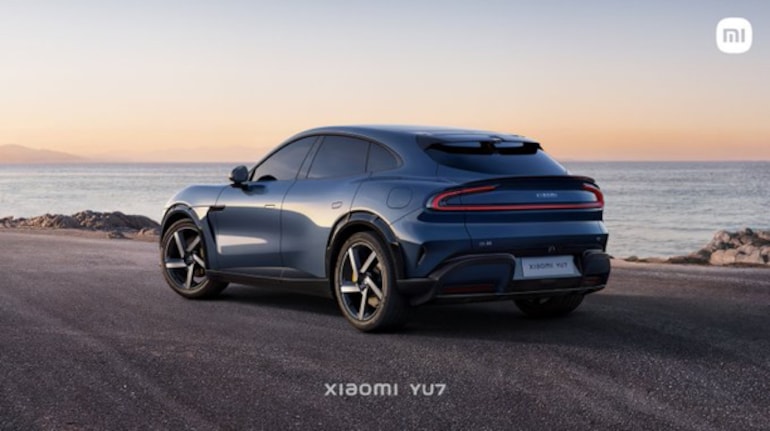
Chinese smartphone maker Xiaomi doesn’t plan to bring its electric smart cars to India and nor is it looking to export smartphones from its Indian factories, with its 2025 strategy focusing on smart-home devices and riding the phone premiumisation wave.
The company, which showcased the SU7 electric smart car in Bengaluru during Xiaomi’s celebration of a decade of operations in India, has said its strategy is first to focus on the Chinese market. Xiaomi, on December 9, has expanded its EV portfolio with the launch of the YU7 SUV, scheduled for summer 2025 in China.
“We will have to bring in products as per market needs. Our entire EV strategy is just seven months old,” Xiaomi India’s chief marketing officer, Anuj Sharma, told Moneycontrol in an interview.
Xiaomi is a tech-forward company and is still improving its technology. “There are too many things in the process, and it’s probably too early to think from an Indian perspective. We have a lot of other priorities planned for India,” Sharma said.
Xiaomi chairman Lei Jun has said the company’s EV focus would exclusively be on China for the first three years, the company's India’s chief business officer Sudin Mathur said. “This approach allows us to develop the technology, and maybe after that, once we are confident, we can explore markets outside China,” Mathur said.
Leadership transition
In their first media interview since the leadership change at Xiaomi India, Mathur, who joined the company in September 2024, described the transition as “smooth and seamless.”
He said that the company has maintained regular communication with partners to keep them informed about the changes.
In November, Xiaomi India president Muralikrishnan B stepped down to further his academic goals.
2025 strategy: Premium smartphones, IoT expansion
As part of its 2025 strategy, Xiaomi is positioning itself as a "smartphone + IoT" leader. The company plans to expand its portfolio with new product categories, including integrated smart home devices and other Internet of Things (IoT) products.
“We aim to establish ourselves as a smartphone and IoT brand in India, offering a range of integrated and home devices. Globally, we are exploring multiple product categories and building channel capabilities to reach our target consumers,” Mathur said.
Sharma said the telcos' rollout of 5G-based Fixed Wireless Access (FWA) broadband would boost Xiaomi’s smart-home strategy in India.
“We have a slew of smart home products that we could introduce,” Sharma said, adding that the company would leverage its retail channels to showcase non-smartphone products such as tablets, smart TVs and other IoT offerings.
While Xiaomi doesn’t plan to expand its retail network, Mathur said the existing stores would be used to push its IoT strategy by displaying a broader range of products.
The Chinese company also plans to sharpen its focus on the premium smartphone segment. It aims to introduce more devices and diversify into non-handset categories as 5G connectivity becomes more widespread in India.
“We had limited devices in the premium segment, which we addressed this year with three new phones. In 2025, we will launch more devices in this category. However, it’s a step-by-step process before we start seeing significant volumes,” Sharma said.
Mathur said the Rs 30,000–Rs 45,000 price segment was growing rapidly, reflecting a market-wide premiumisation trend. “Average selling prices (ASPs) have risen from Rs 10,000 five years ago to Rs 23,000–Rs 24,000 now. This shift will continue, which is why we are focusing on the premium segment,” he said.
Xiaomi is set to launch its flagship Xiaomi 15 series, developed in partnership with German camera maker Leica, in India in the new year. The series was launched in China in October 2024.
Xiaomi slipped to fifth in smartphone shipments in the September quarter with an 11.4 percent market share, market tracker IDC's recent India Q3 report said. Its shipments, however, grew 2.7 percent year-on-year.
No exports
Despite working with local contract manufacturers under the government’s Production Linked Incentive (PLI) scheme, Xiaomi has no immediate plans to export smartphones from its Indian factories.
A small pilot project to export smartphones to Bangladesh and Nepal was launched earlier but was not scaled up.
Xiaomi works with Indian companies such as Dixon and Optiemus to make smartphones, powerbanks and audio wearable products in India.
“We are a large brand and have set aggressive targets to double smartphone shipments to 700 million over the next decade in India. We will prioritise our efforts to achieve these targets,” Mathur said.
The company is engaging with contract manufacturers to begin local production of tablets, anticipating robust sales growth in the segment.
Xiaomi’s India leadership is also tracking developments around the upcoming electronics components scheme. “We work closely with our EMS partners. Only once there is clarity can we decide on our proposal,” Mathur said.
He said rural growth is a key driver for the migration from feature phones to smartphones, with 16 million users transitioning in the past year. “This trend is expected to accelerate further with the increasing penetration of 5G smartphones,” he added.

Discover the latest Business News, Sensex, and Nifty updates. Obtain Personal Finance insights, tax queries, and expert opinions on Moneycontrol or download the Moneycontrol App to stay updated!